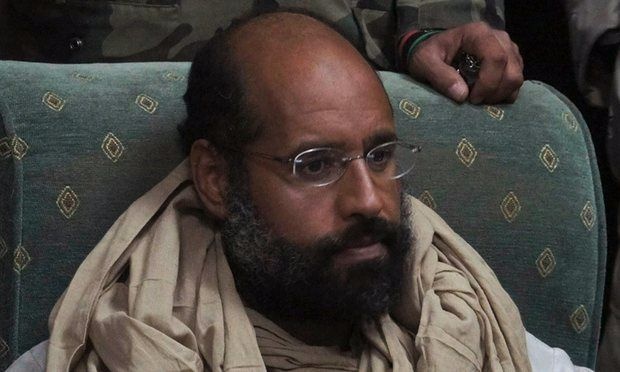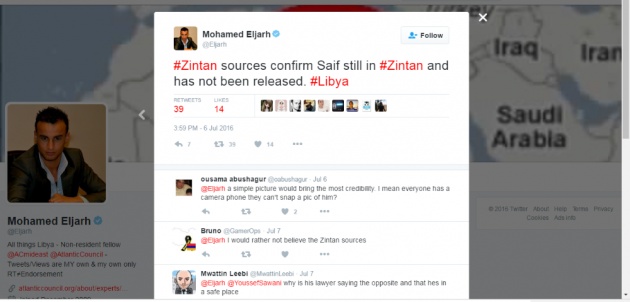
Saif al-Islam after his capture in 2011. Photograph: Reuters
Chris Stephen
Thursday 7 July 2016 13.26 BST
View more sharing options
This article is 5 months old
Shares
2759
Muammar Gaddafi’s son Saif al-Islam has been released from custody after his death sentence was quashed, his British lawyer has claimed.
Karim Khan QC said he was now petitioning the international criminal court to drop its charges against Saif, which would allow him to travel abroad without facing arrest.
Saif, 44, the most prominent of Gaddafi’s eight children, was sentenced to death by a Tripoli court last July in a mass trial of former regime officials.
Khan said the sentence had been quashed by Libya’s new UN-backed government this year, and Saif was now at an undisclosed location after being released from house arrest in the mountain town of Zintan where he had been held for five years.
“He’s been released from Zintan detention. The release, I’m told, was on 12 April – there was an order from the central government,” said Khan. “He’s in Libya, he’s in good health, he’s safe and he’s well.”
The claim could not be independently verified, and neither the UN-backed government in Tripoli or Zintan authorities has yet commented on the report, while some disputed it.
Atlantic Council analyst Mohammed Eljarh tweeted: “#Zintan sources confirm Saif still in #Zintan and has not been released.”

In practical terms, an amnesty for Saif would not be a decision the government can enforce, with Zintan refusing to recognise its powers and deferring to a rival parliament in Tobruk. Zintan is home to one of the most powerful Libyan militias, and any release would depend on agreement by Zintan leaders.
But, if true, it would mark a remarkable turnaround for a figure pilloried by many in Libya for having supported his father during an eight-month civil war in 2011. After his father was killed in August that year, Saif was captured in the Sahara desert trying to flee to Niger.
During the dictatorship, Saif was the dictator’s heir apparent. He lived in a £10m mansion in London’s Hampstead Garden Suburb and earned a PhD from the London School of Economics.
He enjoyed the high life and was well-connected in British society, with contacts including the billionaire hedge fund investor Nat Rothschild, the Labour peer Peter Mandelson and the architect Norman Foster.
When revolution broke out in Libya in February 2011, Saif returned there to support his father, giving television broadcasts castigating the rebels.
Saif al-Islam Gaddafi: the prophet of his own doom
Read more
He was charged with crimes against humanity by the ICC in The Hague, but when court officers visited him in Zintan in 2012 they were detained for three weeks by town authorities.
Saif’s Tripoli trial began in 2014 and was fraught because Zintan refused to release him. He addressed court officials by video link. Human rights groups and the UN said there was a lack of due process in the trial. The death sentence was also handed down to Gaddafi’s former spy chief Abdullah al-Senussi, who remains in prison.
Libya has yet to publish its reasoning for the reported amnesty. Khan said the ICC must now drop its case because of rules prohibiting a suspect from being tried twice for the same crimes.
“There was a trial, there was a conviction, he was sentenced to death. After that there was an amnesty,” he said. “I’m going to be filing an application that the case is inadmissible at the ICC under article 20 of the statute concerning double jeopardy.”
Khan said Saif had no plans to return to Britain. “He wants to stay in Libya,” he said.
The release claim comes amid a wider amnesty granted to Gaddafi-era prisoners by the UN-backed government to promote reconciliation. That amnesty decision has mushroomed into a crisis after 12 former regime prisoners were murdered and their bodies dumped in Tripoli last month, the day after they were due for release.
The failure to arrest the killers has raised questions about how much control the new government, installed in March, exercises over the capital and its disparate militias.
Fears for the safety of remaining Tripoli detainees after the killings has seen the British lawyers for al-Senussi petition the ICC to change an earlier decision that Libya is a competent place to try him.
“We are deeply concerned by reports of the killing of detainees in Tripoli,” said lawyers Ben Emmerson and Rodney Dixon in a statement. “It is essential that the ICC chief prosecutor call for a full review.”
Since the revolution, the Gaddafi family has scattered across the world. Two of Saif’s brothers, Khamis and Mutassim, were killed in the uprising while brothers Hannibal and Muhammed, sisters Aisha and Hanna and mother Safiya fled to Algeria and later Oman.
In December Hannibal was briefly kidnapped by an armed group in Lebanon wanting information about a Shia Imam who went missing in Libya during the dictatorship.
Another brother Saadi, 43, remains in prison in Tripoli facing war crimes charges, after being extradited from Niger.



